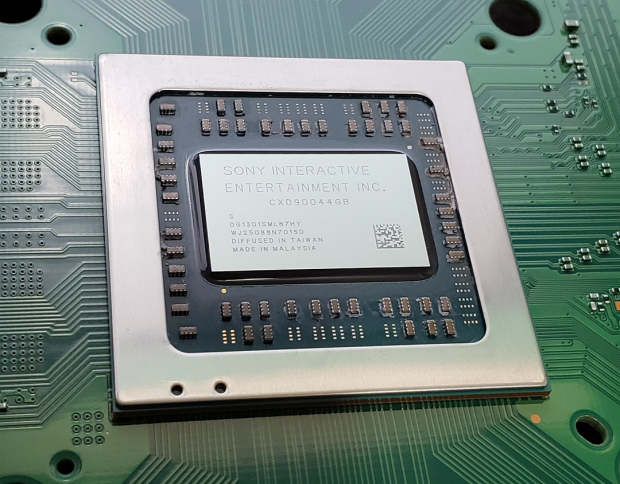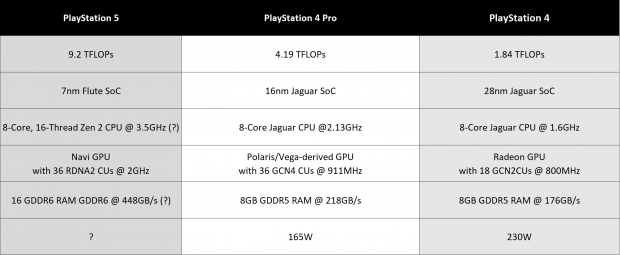There's a new report going around that the next-gen PlayStation 5 will play PS1, PS2, and PS3 era games with noticable upgrades and enhancements. This seems unlikely outside of slight native perf boosts, and PS4 games may get more dramatic optimizations including various wizardy like variable rate shading, ray tracing, and a new era of upscaling tech.

According to HipHopGamer, Sony's PS5 has a "remastering engine" that will upgrade legacy PS1, PS2, and PS3 games with new features like supersampled graphics, improved anti-aliasing, and more. There's also mention of ray tracing being injected into old-school PlayStation games to revitalize visuals, similar to how NVIDIA optimized Quake and Minecraft with RTX. This dramatic level of enhancing probably won't extend that far, though.
What HipHopGamer is describing is basically the Xbox One X's Boost Mode functionality, a built-in feature that natively refines performance of specific games, namely with smoothing frame rates, improving texture filtering, reducing screen tearing.
There's a big difference between Boost Mode and remastering a game, though. The latter requires lots of attention from developers, whereas the former is on-console upscaling that harnesses upgraded CPU and GPU tech to emulate an original system while playing the game better.
The idea here is PlayStation 5 and Xbox Series X will push Boost Mode to a new level. Microsoft's Phil Spencer already said the Xbox SX aims to natively enhance four generations' worth of Xbox games, and the PlayStation 5's SoC was likewise built with backward compatibility in mind.
I do think there's some truth to this. But I don't necessarily think that every supported generation will get the same benefits. Even if older legacy games are supported via disc, PS4 games may be the only titles that get serious enhancements. Think of these upgrades as manual updates released by developers, similar to the Xbox One X and PlayStation 4 Pro enhancement patches that add 4K textures and other refinements to specific games.
So essentially we could see the PlayStation 5 and Xbox Series X further the two main improvement features available to current-gen: Boost Mode and the enhancement patches.
There's reason to believe the PlayStation 5 could play older PS1, PS2, and PS3 games. Sony filed a few patents indicating that on-console backward compatibility was not only in development, but it could include legacy platforms. There's also reports the PS5 could natively play game discs from every PlayStation generation.
Sony has only confirmed PlayStation 4 backward compatibility on PS5 though, and the other legacy systems are less likely to happen (especially with their albeit limited availability on PS Now).
We know the PlayStation 5's Navi GPU has three different performance profiles that can downscale performance to natively emulate PS4 and PS4 Pro consoles. When you put a PS4 disc into the PS5, the console's GPU will automatically adjust itself to mimic a PS4's GPU frequencies and ROPs.
The PS5 modes include:
- Gen2 mode - Fully unlocks the Navi GPU at 2GHz for next-gen games
- Gen1 mode - Downscales the GPU to 911MHz, 218GB/sec bandwidth, and 64 ROPs to emulate the PS4 Pro
- Gen0 mode - Drops the GPU to 800MHz with 176GB/sec bandwidth and 32 ROPs to emulate the base PS4
The leaked info didn't mention any other profiles for other systems, possibly indicating PS1, PS2, and PS3 games are off the table.

But what if Sony and Microsoft are able to upgrade older games without much effort? What if they could sort of automate the process on-console? It's kind of possible...but not likely.
AI can improve performance of games by means of deep learning. NVIDIA has Deep Learning Super Sampling, or DLSS, built into its GeForce RTX cards.
The cards use the NGX platform, which contains AI software connected to a DNN (Deep Neural Network) that can enhance in-game visuals. DLSS is made for graphically-intensive workloads, though, not playing old PS1 games like Final Fantasy VII with boosted visuals.
"DLSS is designed to boost frame rates at high GPU workloads (i.e. when your framerate is low and your GPU is working to its full capacity without bottlenecks or other limitations). If your game is already running at high frame rates, your GPU's frame rendering time may be shorter than the DLSS execution time. In this case, DLSS is not available because it would not improve your framerate. However, if your game is heavily utilizing the GPU (e.g. FPS is below ~60), DLSS provides an optimal performance boost. You can crank up your settings to maximize your gains. (Note: 60 FPS is an approximation -- the exact number varies by game and what graphics settings are enabled)"
AMD has something called Radeon Image Sharpening, or FidelityFX, that can be switched on and sharpen and upsample images.
AMD FidelityFX is our open source image quality toolkit that is now available for developers to implement into their game. FidelityFX uses Contrast-Adaptive Sharpening (CAS) to deliver great looking visuals while gaming. FidelityFX automatically reduces overhead and frees up your GPU for the visceral experience you demand.
All of this is PC tech, though, and remember that the PlayStation 5 and Xbox Series X both use highly customized SoCs.
The main reason that PS4 games are likely to get more enhancements than older legacy games is pretty simple: They're closer to the PlayStation 5's architecture. That doesn't mean the PS5 won't have some sort of internal wizardry to boost perf of old games, but we shouldn't expect it to be some huge engine that remasters PS1 games with overhauled graphics.
If anything, we need to tamper our expectations. We'll be lucky if the PS5 even plays PS1, PS2, or PS3 games, let alone with a few native touch-ups. Upgrading PS4 games is much, much more valuable to Sony than investing blanket tech that retroactively "remasters" any legacy game you put into the console. It's a nice pipe-dream, but it's just not economical, and lighter Boost Mode features are more likely.
The transition between PS4 and PS5 generations will be a multi-year endeavor, in which Sony will simultaneously release games on both systems. We'll likely see two SKUs from publishers/developers: a PS4 and PS5 version, complete with enhancement patches for the PS4 versions of their games.
Then again, I'd love to think that developers and publishers like Capcom could "patch-in" updates to their older titles. Imagine Resident Evil 2 with more levels or content, or even ray tracing? We're pretty sure it's just wishful thinking though.
Sony is expected to reveal the PS5 in a special event in February 2020. The console will release in Holiday 2020, and it may cost $499.
Check below for more info:
PlayStation 5 specs and details:
- Custom SoC with second-gen Navi GPU, Zen 2 CPU
- 8-Core, 16-thread Zen 2 CPU at 3.2GHz
- Navi GPU at 2.0GHz with 36 Compute Units
- Navi, Zen SoC uses new AMD RDNA 2.0 architecture
- Ultra-fast SSD
- Support for 4K 120 Hz TVs
- Ray-tracing enabled
- 8K output support (for gaming)
- Plays all PS4 games
- Separate games that ship on BD-XL Blu-ray discs
- New controller with extensive haptic and tactile feedback
PlayStation 5 Coverage:
- PlayStation 5 GPU emulates PS4, PS4 Pro with special modes
- Sony: The future is coming at CES 2020
- PlayStation 5 GPU: 9.2 TFLOPs with 36 custom Navi compute units
- PlayStation 5 GPU emulates PS4, PS4 Pro with special modes
- PS5, Xbox Series X SSD may use software-defined flash to boost speeds
- PS5's SSD is 'exceptionally powerful,' may beat Xbox Series X speeds
- DualShock 5 renders show new trigger design, USB-C, ergonomic shell
- PlayStation 5 to support 8K gaming, Sony confirms
- New PlayStation 5 renders show off radical different design, again
- Leaked PlayStation 5 ad prices console at $1,000, is totally fake
- Sony seeks a new Head of Strategy for Worldwide Studios
- Leaked PlayStation 5 devkit photos show new DualShock controller
- PS5, Xbox Scarlett SSD may use Optane-like ReRAM to supercharge speeds
- NVIDIA G-Sync monitors to improve PlayStation 5 and Xbox Scarlett
- PlayStation 5: Everything We Know So Far
- PlayStation 5 confirmed to have 8C/16T Zen 2 CPU from AMD
- PS5, Project Scarlett may use Samsung's 6th gen V-NAND NVMe SSDs
- PS5 backward compatibility confirmed, will play PS4 games
- Sony's next-gen PlayStation 5 has 4K 120Hz output support
- PS5, Project Scarlett to hit over 10TFLOPs of power, sources say
- PS4 will be supported into 2022, to live alongside PS5
- Sony: ultra-high-speed SSD is 'the key' to next-gen PS5
- PS5 dev kit rumor: 'ultra-fast RAM', Navi GPU with 13 TFLOPs
- PlayStation 5 rumored to ship with 2TB of super-fast SSD for $499
- Insider: PlayStation 5 dev kit faster than Xbox Scarlett right now
- PS5 cartridges aren't real, patents are for Sony kids toys
- PS5's SSD may benefit PS4 games the most
- PS5 powered by Navi in 2020, AMD making Navi with Sony input
- Cloud-powered PlayStation controller may let you play free game demos
- Gran Turismo 7 is a PlayStation 5 launch title: launches Nov 20, 2020
- PS5 confirmed to support 8K video, ray tracing, all on Navi
- PlayStation 5 rumored to cost $499, launches November 20, 2020
- PlayStation game demos are coming back with Sony's ambitious new plan
- PS5 controller: Built-in mic, USB-C, no lightbar, ergonomic design
- PlayStation 5 concept video shows totally new design
- Sony solves PS5's biggest issue
- Sony: PS5 development going according to plan
- New Viking Assassin's Creed may be next-gen console launch game
- AMD working on 'secret sauce' for next-gen Xbox/PlayStation
- The first real photo of a PlayStation 5 dev kit appears
- Next-gen PS5/Xbox Scarlett open-world game: 'best real-time graphics'
- Sony restructures workforce to prepare for PS5
- PlayStation VR 2: built-in cameras, wireless, ready for PS5
- PS5 games will ship on 100GB Blu-ray BDXL discs
- PS5 and Xbox Scarlett will both handle ray tracing differently
- PlayStation 5 could feature AI-powered 'PlayStation Assist'
- Sony won't abandon singleplayer story-driven games on PS5
- PS5 rumor: GPU is nearly as powerful as RTX 2080, GPU clocked at 2GHz
- PlayStation 5 rumored to be unveiled on February 12, 2020
- Sony to raise PS5 cost thanks to U.S. tariffs


